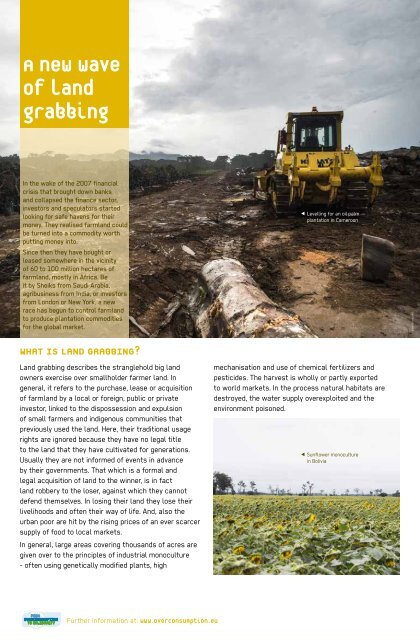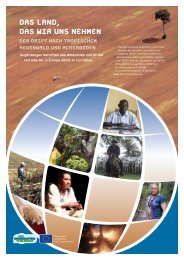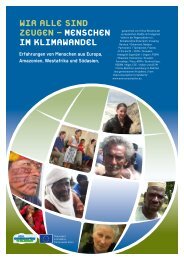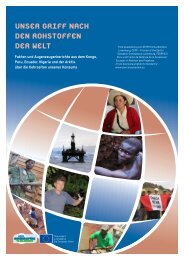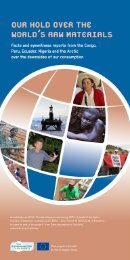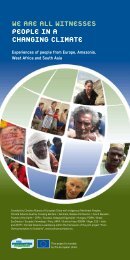THE LAND WE GRAB
Create successful ePaper yourself
Turn your PDF publications into a flip-book with our unique Google optimized e-Paper software.
A new wave<br />
of land<br />
grabbing<br />
In the wake of the 2007 financial<br />
crisis that brought down banks<br />
and collapsed the finance sector,<br />
investors and speculators started<br />
looking for safe havens for their<br />
money. They realised farmland could<br />
be turned into a commodity worth<br />
putting money into.<br />
Since then they have bought or<br />
leased somewhere in the vicinity<br />
of 60 to 100 million hectares of<br />
farmland, mostly in Africa. Be<br />
it by Sheiks from Saudi Arabia,<br />
agribusiness from India, or investors<br />
from London or New York, a new<br />
race has begun to control farmland<br />
to produce plantation commodities<br />
for the global market.<br />
Levelling for an oil palm<br />
plantation in Cameroon<br />
© PATRICK GALBATS<br />
WHAT IS <strong>LAND</strong> <strong>GRAB</strong>BING?<br />
Land grabbing describes the stranglehold big land<br />
owners exercise over smallholder farmer land. In<br />
general, it refers to the purchase, lease or acquisition<br />
of farmland by a local or foreign, public or private<br />
investor, linked to the dispossession and expulsion<br />
of small farmers and indigenous communities that<br />
previously used the land. Here, their traditional usage<br />
rights are ignored because they have no legal title<br />
to the land that they have cultivated for generations.<br />
Usually they are not informed of events in advance<br />
by their governments. That which is a formal and<br />
legal acquisition of land to the winner, is in fact<br />
land robbery to the loser, against which they cannot<br />
defend themselves. In losing their land they lose their<br />
livelihoods and often their way of life. And, also the<br />
urban poor are hit by the rising prices of an ever scarcer<br />
supply of food to local markets.<br />
In general, large areas covering thousands of acres are<br />
given over to the principles of industrial monoculture<br />
- often using genetically modified plants, high<br />
mechanisation and use of chemical fertilizers and<br />
pesticides. The harvest is wholly or partly exported<br />
to world markets. In the process natural habitats are<br />
destroyed, the water supply overexploited and the<br />
environment poisoned.<br />
Sunflower monoculture<br />
in Bolivia<br />
© PATRICK GALBATS<br />
Further information at: www.overconsumption.eu


